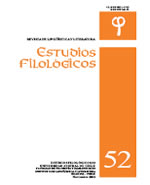Ideological, grammatical and lexical aspects of linguistic sexism
Main Article Content
Abstract
The report of the Real Academia Española signed by Ignacio Bosque has intensified the debate about the recent attempts to avoid women's invisibility in language. In this paper our aim is a double task: on the one hand, we want to analyze the nature of grammatical gender in Spanish from the point of view of Cognitive Linguistics. We will show that, contrary to what has been frequently defended, the allegedly generic use of masculine grammatical gender is actually due to a masculine interpretation of reality. On the other hand, an analysis of some RAE usual dictionary entries will allow us to conclude that some expressions that undervalue women are still remaining in this lexicographic work. This resistance to changes favoring gender equality highlights to what extent it is necessary to keep alive a reflection on ideology in the academic linguistic discourse.

